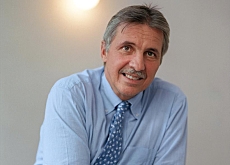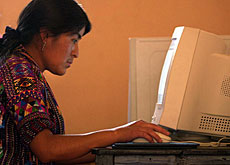Furrer withdraws ITU candidature

Switzerland's Marc Furrer will not become the new head of the Geneva-based International Telecommunications Union (ITU), withdrawing from the running on Thursday.
Furrer, who is head of the Federal Communications Commission, finished last among the six candidates after the second round of voting.
The new secretary-general is now expected to be either Mali’s Hamadoun Touré who received 72 votes after the second round, or Germany’s Matthias Kurth with 51. A final vote will be held on Friday in Antalya, Turkey, where ministers from ITU member countries have gathered for a major conference.
Whoever is elected to replace Japan’s Yoshio Utsumi will be expected to introduce reforms to the cash-strapped organisation. The ITU operates within the United Nations system where governments and the private sector coordinate global telecom networks and services.
Before the vote, Furrer, who played a leading role in the World Summit on the Information Society (WSIS), spoke to swissinfo.

More
Federal Communications Commission (ComCom)
swissinfo: How has your campaign gone?
Marc Furrer: One disadvantage I face is to represent a country that does not belong to any bloc, unlike the candidates from the European Union and Brazil. But at the same time I am well known, especially within the ITU, for my involvement in the organisation of the World Summit on the Information Society, which took place in Geneva in 2003 and in Tunis in 2005.
But the decision to support one or another candidate is usually taken by the foreign ministers of member states, based mainly on political criteria.
I would like to point out that the Swiss foreign ministry and its network of embassies have supported me a great deal.
swissinfo: What will be your priorities, should you be elected?
M.F.: First, it needs to be stressed that the ITU faces big problems. For example, its budget is short of SFr40 million ($32 million). I hope the conference that is taking place at the moment in Antalya will be able to come up with a balanced budget.
The ITU needs to cut costs, work more efficiently and perhaps be more selective regarding its mandates. For this reason, it needs a strong administrator at its head. I faced a similar task as director of the Federal Communications Office, which over the past few years has had to carry out a growing number of responsibilities with ever-shrinking funds.
In addition, the atmosphere among ITU staff is not perfect, to put it mildly. So it is essential that they are motivated to fulfil a mission that is not easy.
swissinfo: What other reforms do you have in mind?
M.F.: The ITU is too technocratic, and its management needs to be more in touch with society. This was the goal of the World Summit on the Information Society, but to be honest there has been no follow-up to the summit.
This is a real pity in view of the themes addressed by the WSIS, such as questions about content, use of information technologies for development and health, online public administration and security issues. For this reason, we need to step up cooperation with other international organisations to ensure the summit follows through.
If elected president, I would very much like ensure this happens. This would give the ITU the role it deserves, whereas today the organisation is marginalised and restricted to technical issues.
Finally, I propose improving relations with the private sector, since telecommunications cannot advance without [the support of] businesses, and to enable developing countries to have access to information and communication technologies, which are essential tools in the economic development of these countries.
swissinfo-interview: Frédéric Burnand in Geneva
The 17th ministerial conference of ITU member states opened in Antalya, Turkey, on November 6 and runs until November 24.
Held every four years, the meeting is being attended by more than 2,000 participants – including 80 ministers – from over 150 countries, representing both government and the private sector as well as regional and international organisations.
Delegates are due to consider a number of reform proposals, the ITU budget and the way the organisation functions – and to choose a new secretary-general.
Marc Furrer biography:
1988-1992: political secretary to Adolf Ogi, communications minister.
1992-2005: director of the Federal Communications Office.
2003: Responsible for content and organisational preparations for the first phase of the UN World Summit on the Information Society.
2005: Head of the Swiss delegation during the second phase of the WSIS in Tunis.
2005-present: President of the Federal Communications Commission.

In compliance with the JTI standards
More: SWI swissinfo.ch certified by the Journalism Trust Initiative


You can find an overview of ongoing debates with our journalists here. Please join us!
If you want to start a conversation about a topic raised in this article or want to report factual errors, email us at english@swissinfo.ch.